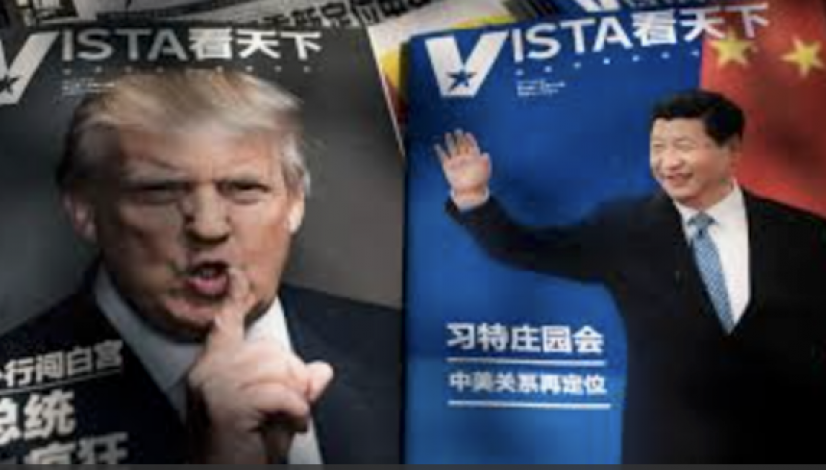Trump’s trade war with China gathers steam — and purpose

The Marriott hack could not have come at a better time. As U.S. cherry growers and bourbon producers and many other groups suffer dropping exports due to retaliatory tariffs and as traders get smacked by volatile markets, it is important for Americans to be reminded anew why the Trump White House is taking a hard line with China.
The most recent news is that a Chinese state-sponsored entity is likely behind the vast breach of the Marriott Hotel’s Starwood chain, which captured data on some 500 million people. As the massive theft from the hotel’s data base makes clear, China continues to abuse American interests and individuals.
Beijing steals private information on our citizens and has also overseen vast thefts of U.S. intellectual property through cyber spying and forced technology transfers, allowed widespread counterfeiting of American products and has prevented U.S. firms from succeeding in China.
It has also cheated on treaties; Huawei’s purported evasion of the Iran sanctions is not a one-off. Beijing has been frequently called out for illicit trading with North Korea.
The arrest of Meng Wanzhou, the CFO of Huawei, was another heads-up to the international community that President Trump’s administration intends to hold China to account for its misbehavior.
The Trump administration is preparing counter-measures attacking China’s misdeeds, including possibly indicting hackers known to work for the Ministry of State Security, which evidently carried out the theft of information from Marriott.
The White House intends to declassify intelligence documents that would pinpoint Beijing’s spying over the past several years, according to The New York Times.
The Marriott intrusion is not unique. In 2015, U.S. intelligence officials blamed China for engineering the hack of the Office of Personnel Management (OPM), stealing information on 22 million Americans, many of whom had security clearances.
The business community is anxious that the Marriott hack and evidence of other wrongdoing could derail the trade talks going on between China and the U.S. It is a legitimate concern; markets tumbled after the arrest of the Huawei executive out of similar worries. It is hard to imagine an amicable negotiation moving forward in the midst of such confrontations.
But, it is not an amicable negotiation, even though President Trump has made it clear that he wants a deal and thinks there is an opportunity to secure better trade terms with China. Politically, settling the trade dispute is important for the president and for his party as they begin to prepare for the 2020 elections.
President Trump has boasted of his success in ramping up growth and employment; there are signs that the trade battle is taking some of the zip out of that achievement.
Nonetheless, Trump has also made it clear that simply lowering tariffs or granting a few U.S. firms permits to operate in China will not suffice. He intends to curb China’s worst misbehavior, at long last.
President Obama took a different approach. Keen to get Beijing’s cooperation with the Paris Agreement and with the Iran nuclear deal, he effectively did nothing to confront China’s hacking and cheating.
In the wake of the OPM hack, Obama reached a “common understanding”with President Xi Jinping on reining in Beijing’s cyber spying for commercial purposes, and threatened sanctions if the attacks continued. Obsessed with securing a climate deal, those threats never materialized.
Many are skeptical that President Trump will succeed. They may be underestimating his staying power. They may also be underestimating how much China wants a deal.
Beijing has just recently offered up some olive branches, which include the first major purchase of soybeans from the U.S. since President Xi and President Trump met at the Group of 20 (G20) summit.
Chinese state-owned companies reportedly bought $180 million in soybeans at the open of trading yesterday, sending soy futures soaring.
Also in the past few days, China announced it would dial back the 40-percent tariffs levied on cars imported from the U.S. in July, possibly settling at the former 15-percent level.
In addition, the government is reportedly preparing to replace its controversial “Made in China 2025” industrial roadmap with a new program that is less protectionist and allows foreign firms to play a bigger role.
Given the broad ambitions of “Made in 2025,” which called for China to become dominant in high-tech industries like robotics and electronics, it had become a lightning rod for criticism, from the Trump White House and from other nations.
Why is China seemingly bending to Trump’s demands? A report from Citigroup provides some insight. Economists at the bank predict that the trade skirmish with the U.S. could halve China’s export growth next year and result in 4.4 million lost jobs.
More immediately, reports released last weekend indicate that China’s economy continues to slow. The producer price index increased less than 3 percent last month from the year before, the slowest pace in over two years.
Car sales in China have dropped for six straight months, and the 2018 total may actually come in below the prior year, for the first time in 20 years or more.
Trade also slowed, suggesting sluggish domestic demand. China-watchers are expecting the central bank to undertake another round of stimulus to counter the weakness.
Meanwhile, President Trump is not alone in this battle. Other countries have also been on the losing end of China’s malpractices, and are increasingly speaking out, perhaps emboldened by Trump’s leadership. The agreement at the G20 endorsed World Trade Organization reform, which was a strong vote in favor of reining in Beijing.
No one wants an extended trade war, but the Marriott theft reminds us all of what is at stake.
Published on The Hill




